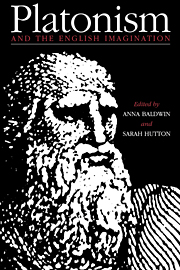Book contents
- Frontmatter
- Contents
- Notes on contributors
- Preface
- I ANTIQUITY
- II THE EARLY CHRISTIAN PERIOD AND THE MIDDLE AGES
- III THE RENAISSANCE AND THE SEVENTEENTH CENTURY
- 7 Introduction
- 8 The transformation of Platonic love in the Italian Renaissance
- 9 Uses of Plato by Erasmus and More
- 10 Italian Neoplatonism and the poetry of Sidney,Shakespeare, Chapman and Donne
- 11 Shakespeare on beauty, truth and transcendence
- 12 Platonism in Spenser's Mutability Cantos
- 13 Reason, Recollection and the Cambridge Platonists
- 14 Platonic ascents and descents in Milton
- 15 Platonism in some Metaphysical poets
- IV THE EIGHTEENTH CENTURY
- V THE NINETEENTH CENTURY
- VI THE TWENTIETH CENTURY
- Bibliography
- Index
13 - Reason, Recollection and the Cambridge Platonists
Published online by Cambridge University Press: 15 December 2009
- Frontmatter
- Contents
- Notes on contributors
- Preface
- I ANTIQUITY
- II THE EARLY CHRISTIAN PERIOD AND THE MIDDLE AGES
- III THE RENAISSANCE AND THE SEVENTEENTH CENTURY
- 7 Introduction
- 8 The transformation of Platonic love in the Italian Renaissance
- 9 Uses of Plato by Erasmus and More
- 10 Italian Neoplatonism and the poetry of Sidney,Shakespeare, Chapman and Donne
- 11 Shakespeare on beauty, truth and transcendence
- 12 Platonism in Spenser's Mutability Cantos
- 13 Reason, Recollection and the Cambridge Platonists
- 14 Platonic ascents and descents in Milton
- 15 Platonism in some Metaphysical poets
- IV THE EIGHTEENTH CENTURY
- V THE NINETEENTH CENTURY
- VI THE TWENTIETH CENTURY
- Bibliography
- Index
Summary
The Cambridge Platonists had a distinctly ambivalent attitude towards one of Plato's most well-known doctrines, the Theory of Recollection (anamnēsis). (See Anne Sheppard, pp. 9–10). On the one hand they embraced a close relative of the theory, the doctrine of innate ideas, which was bound up with their laudably Platonic belief that learning is essentially a matter of drawing upon one's own resources rather than relying wholesale on extrinsic sources. On the other hand they rejected, for a variety of reasons, any literal version of recollection itself. This essay will explore what led them into something of a love–hate relationship with Platonic recollection. I shall confine my discussion to those of them whose writings were most extensive on this subject, Whichcote, More and Cudworth.First,however, a note about the theory itself. It first appears in Plato's Meno (81a sq.), and Socrates attempts to demonstrate it by taking a slave boy and asking him questions about a geometrical figure drawn in the sand. At first the slave gives the wrong answers but after repeated questions solves the problem. At the end, Socrates insists that he never taught the boy anything, but only asked questions (85b–d). As the boy has never been taught geometry before in his life, Socrates concludes that he must have had the knowledge within him even before he entered his body: the retrieval of this knowledge is recollection. The theory reappears in the slightly later dialogue, the Phaedo (72e sq.) where it is bound up with the newly emerging theory of forms.
- Type
- Chapter
- Information
- Platonism and the English Imagination , pp. 139 - 150Publisher: Cambridge University PressPrint publication year: 1994
- 3
- Cited by



